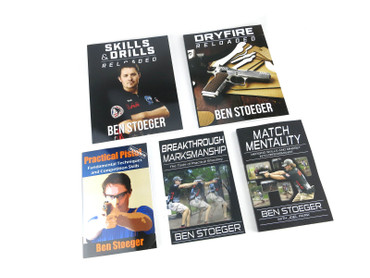Ask around if there are any GMs in your area who give lessons. You will probably balk at the price of a one day lesson, but if your guy is good, it will be worth every penny.
+3
Some good advice above, as well... I'll say this - the brianenos.com forum is a great resource, but you do need to be sensitive to the signal to noise ratio. There's a lot of C class "experts" on there (or, were a few years back when I stopped participating on that forum actively), and due to forum rules, they get to "shout down" folks that know what they're talking about. Doesn't mean it's not a useful resource, at all - it helped me a lot!
One book not mentioned here is Saul Kirsch's "Thinking Practical Shooting" -
https://www.doublealpha.biz/us/thinking-practical-shooting-by-saul-kirsch - what I like about this one is that it's basically a conglomeration of lessons that took many of us years to compile. It's a big short cut to how to prepare for and shoot matches. It's not going to build a bunch of skills, but it'll help you get squared away in terms of what gear you actually need, how to show up at a match and figure out what's going on, and how to get ready to shoot a stage... things like that. It's been a while since I've been through the book - there's a lot more than that in there.
Build a dry fire practice. However, you don't
need to dry fire for hours a day to get better. That's a falsehood. In fact, that can hamper your progress, in some cases. Learn
how to dry fire, and spend 15-30 minutes a day working on specific goals, and you'll be well on your way (especially after having someone look at what you're doing and getting you on the right path). Anderson's and Stoeger's books are both good resources for dry fire drills, and how to use a timer in dry fire to help push yourself. Kirsch's "Perfect Practice" has some good drills, too, and Mike Seeklander also has a good dry/live fire program book. And, if you're interested and have an iPhone, some guy wrote some drills and put them in an iPhone app called "Practice Deck" (it was originally a deck of playing cards before it became an app).
Beyond that, get a reliable handgun, and put GOOD sights on it. Get several mags, and appropriate "leather" (which is mostly Kydex, these days), and get to work dry firing. You can get kooky in dry fire, like this turkey...
- it doesn't all have to be "same old, same old" (although the "same old" stuff is where you're going to grind to make those basic skills better - and everything is basics, all the time!)
Dry fire and some local matches alone can get you to A class - maybe even to Master. You don't have to be rich or have unlimited time to make that happen - and my opinion is that basically anyone with a will to put the work in can make Master in that game.

